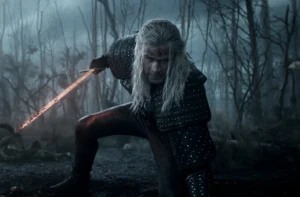Summary
Perhaps more likely to divide opinion than ever, Black Mirror’s fifth outing most importantly doesn’t suggest that Charlie Brooker is running out of ideas any time soon.
Heading into its fifth season, Black Mirror remains one of the most oddly prescient, daringly eclectic and inherently contradictory shows in existence, and if its three-episode fifth outing is anything to go by, it doesn’t intend to give up that mantle anytime soon. It’s an anthology series that flits between genres, styles and tones, a critique of screen addiction that happens to air on the world’s biggest streaming platform, and a cautionary critique of burgeoning technology that, since its debut in 2011, has seen real life almost catch up with its dystopian on-screen exaggerations. Black Mirror Season 5 continues to sweep out the corners of creator and writer Charlie Brooker’s nihilistic imagination, to somewhat mixed but ultimately impressive results.
Perhaps more than ever, though, and despite a certain confidence that has been lacking here and there from previous seasons, the three standalone stories of Black Mirror Season 5 are likely to divide opinion — perhaps even significantly. Its showcase finale episode, “Rachel, Jack and Ashley Too”, which features the inspired stunt-casting of Miley Cyrus as a pop star trying to find freedom from someone else’s creative control, is either easily the best or easily the worst of this new collection; it’s difficult to say which. And something like “Smithereens”, about a grieving ride-share driver who kidnaps an employee of an Apple-like corporation to try and get its CEO on the phone, is at once too slight and minimalist to make much of a long-term impact but also refreshingly and uncomplicatedly effective in its stripped-down approach.
This is all probably fitting, and I’m willing to bet that more of it is intentional than seems obvious at first glance. A show that created an interactive choose-your-own-adventure film on a platform that also recorded all of the player’s decisions obviously understands irony to some extent, and it’s always difficult to gauge its artistic choices because of that; what might be bad writing might just as easily be purposeful writing, intended to make a point or crack a joke, and the show’s endless success is in large part due to how impenetrable its creative underpinnings are. And how often can you say that about anything, much less such a mainstream show?
The fact that Black Mirror Season 5 is so mainstream now will always be, to some, an abandonment of what the show seemed to be trying to do with its cult-favorite early seasons, but it’s difficult to buy into that idea when you see how unhurriedly Brooker navigates these latest what-if ideas, which plug straight into the mains of our current social and technological anxieties. The growing information monopoly of social media companies forms the fizzing paranoiac backbone of “Smithereens”, but “Striking Vipers”, starring Anthony Mackie, is a lightly sensitive unpacking of sexual and gender fluidity. You have to imagine that Brooker is only able to explore tenderness in this way because the show’s rabid popularity means it can afford to not be hopelessly bleak and nihilistic all of the time.
It will, of course, be popular regardless, and will inevitably provoke discussion and ranking listicles and whatever else, but it’s refreshing to see that Brooker doesn’t seem to be running out of ideas with Black Mirror Season 5. It might be a collection that feels as predictably diverse and uneven as any of the others, but it’s also one that can be just as daring, provocative and effective as the show has ever been.




